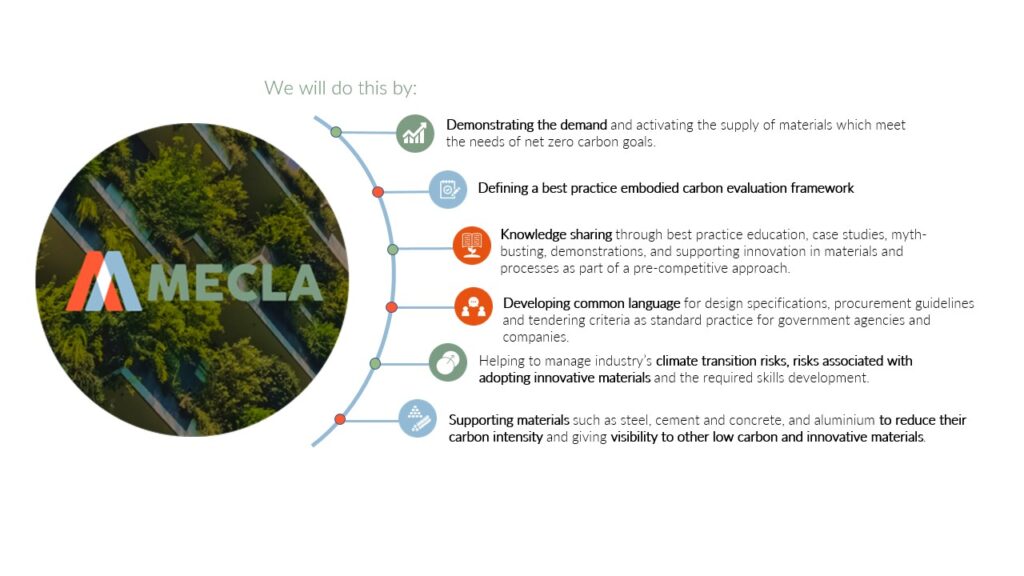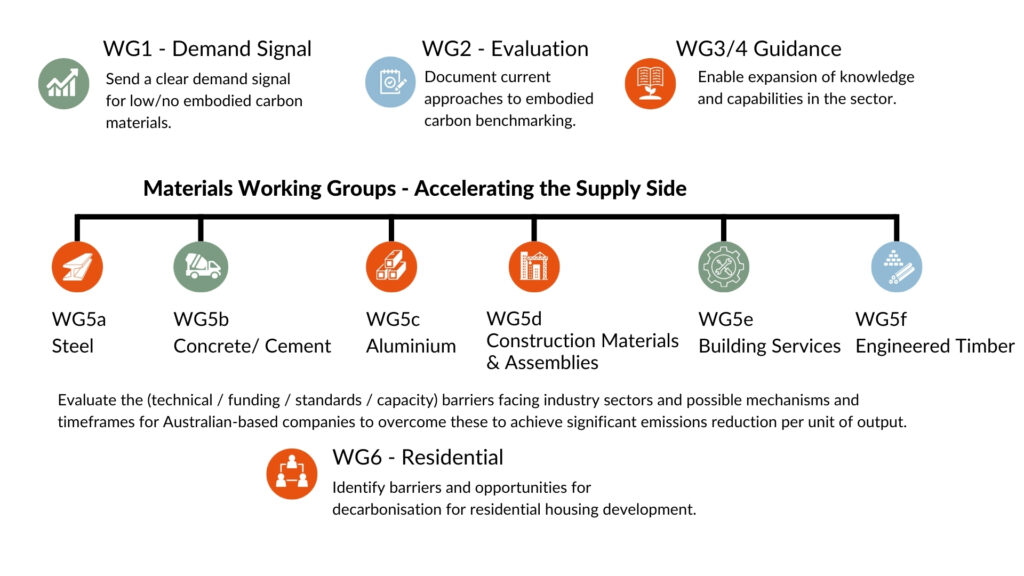About MECLA

What is MECLA
Materials & Embodied Carbon Leaders’ Alliance (MECLA) brings together the drive to reduce embodied carbon in the building and construction industry.
MECLA is determined to transform the building and construction sector to reach Net-Zero emissions. MECLA recognises the growing demand for lower and zero-carbon materials worldwide and explores how we can work together to move Australia towards a zero-carbon economy and position Australia as a top material supplier through systems innovation.
The Situation
The built environment sector including the cities and towns we live and work in is responsible for one-quarter of Australia’s greenhouse emissions. Globally, the steel, cement and aluminium industries alone each produce about 7-9% of annual global greenhouse emissions. All these materials are used extensively in the building and construction of our homes, the places we visit and the roads we drive on and the public transport we catch. Billions of dollars of infrastructure are built each year using these materials that are built to last for many decades into the future. That is a lot of upfront or embodied carbon.
Embodied carbon is the total greenhouse emissions generated during the manufacture of the materials and products used in the construction and refurbishment of new and existing buildings and infrastructure. There is an urgency around embodied carbon to reduce the greenhouse footprint of these materials but it requires collaboration and leadership. And here is what we are doing about it.
MECLA is on a mission to help make the materials used in the building and construction of our cities and towns meet Net Zero carbon targets that align with the Paris Agreement. Reducing the emissions intensity of those sectors will be fundamental to achieving a zero-carbon economy. By bringing different sectors together across the building and construction supply chain we can collectively gain a better understanding of barriers to uptake and find the solutions that will be vital to moving ahead.
What we do
This collaboration of organisations comes together to drive reductions in embodied carbon in the building and construction industry. We seek to align with the Paris Agreement targets and principles of the circular economy and recognise that the building and construction sector is a complex ecosystem.

MECLA Working Groups
MECLA has created 10 working groups dedicated to driving decarbonisation in various parts of industry, addressing specific opportunities and barriers.

MECLA Secretariat

Monica Richter
Monica is an economist and social ecologist with extensive experience in environmental sustainability and an interest in the role of business in accelerating the uptake of low and zero carbon solutions. She currently represents WWF as the Project Director of both MECLA and the Business Renewables Centre. Monica is also chair of the external advisory group to the Urban Transformations Research Centre at Western Sydney University.

Hudson Worsley
Hudson is the co-founder of Presync and MECLA Chair. He works with organisations on their transition to the zero-carbon economy and adaptation to the changing climate. His ability to communicate complex technical concepts in clear language to non-specialists supports the change management required to deliver the economic transition.

Kathy Verheyen
Kathy is the MECLA Senior Project Manager from Climate-KIC Australia. Before this, Kathy was responsible for managing a range of projects, including the Climate Measurment Standards Initiative (CMSI) and several EU-Australian projects on sustainable finance and the EU Green Deal. She has a background in business administration, economics, literature and philosophy.

Alexi Barnstone
Alexi is a Project Officer for Climate-KIC. He has experience in various environmental nonprofits and currently works with MECLA partners helping build capacity for low carbon solutions. He has a first class honours from the University of Sydney and is currently studying a Masters of Environmental Management at the University of New South Wales.